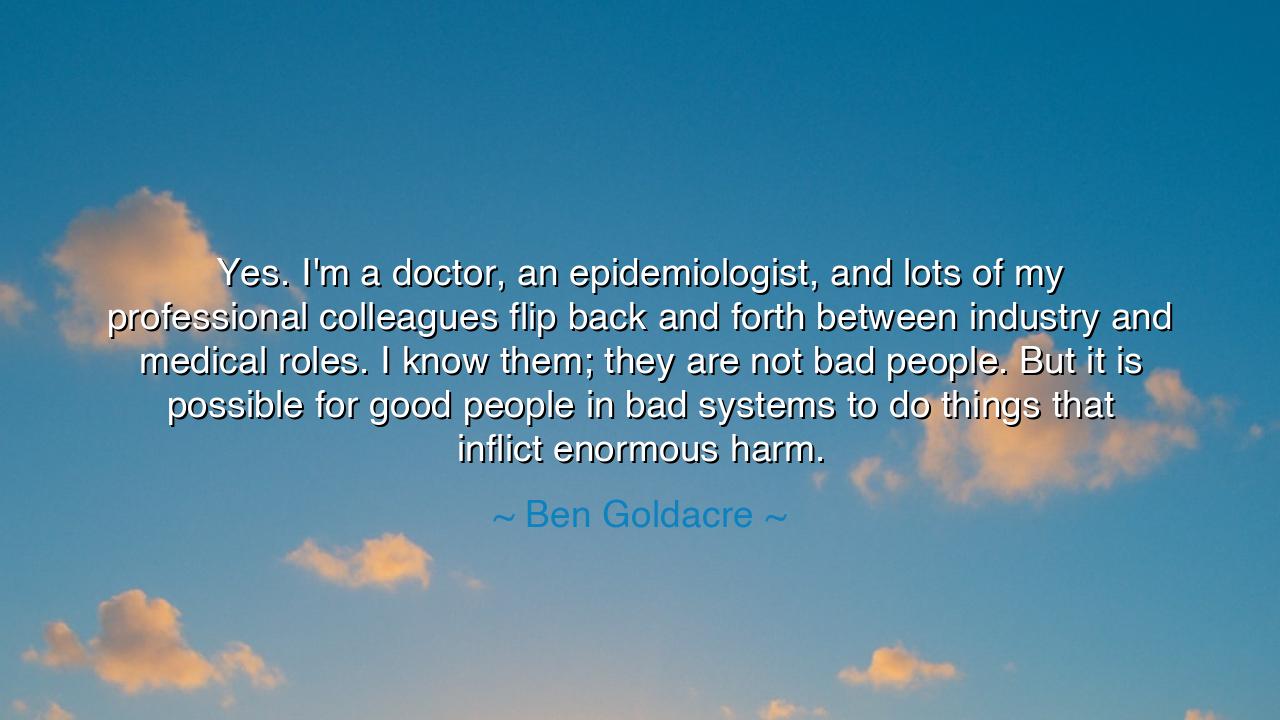
Yes. I'm a doctor, an epidemiologist, and lots of my professional
Yes. I'm a doctor, an epidemiologist, and lots of my professional colleagues flip back and forth between industry and medical roles. I know them; they are not bad people. But it is possible for good people in bad systems to do things that inflict enormous harm.






In the words of Ben Goldacre, physician, scholar, and warrior for truth in science, we are offered a lesson both humbling and profound: “Yes. I'm a doctor, an epidemiologist, and lots of my professional colleagues flip back and forth between industry and medical roles. I know them; they are not bad people. But it is possible for good people in bad systems to do things that inflict enormous harm.” These words pierce like an arrow through the illusion that morality alone can guard against corruption. They remind us that even the most virtuous hearts, when placed in broken systems, may become instruments of harm without ever intending it. It is a teaching as ancient as civilization itself — that goodness is fragile, and that the structures we build around it can either protect or pervert its purpose.
Ben Goldacre, known for his tireless work exposing the distortions of data and the failures of modern medicine, speaks here not with bitterness, but with compassion. He does not condemn his colleagues, nor accuse them of malice; instead, he recognizes the tragedy of systems — how institutions, through complexity and inertia, can twist the intentions of even the most honorable men and women. In the world of medicine and research, where human lives hang upon the integrity of data and the purity of purpose, the stakes are immense. Yet, as Goldacre has shown through his investigations into pharmaceutical trials and publication bias, the pursuit of profit and prestige can warp the truth, not because the people involved are evil, but because the system rewards obedience over integrity.
History is rich with echoes of this same warning. In the laboratories of mid-20th-century medicine, countless experiments were performed with good intentions — to cure disease, to advance knowledge — yet many of these acts were born within structures of blindness and pride. Consider the case of the Tuskegee Study, where physicians observed the progression of untreated syphilis among African American men for decades, even after a cure existed. The doctors involved were not monsters in their own eyes; they believed they were serving science. Yet they served a system that had lost its moral compass. Thus, the harm was not born of hatred, but of habit — the quiet, bureaucratic evil that arises when conscience yields to convention.
Goldacre’s words remind us that systems shape souls. When the culture of an institution prizes results over righteousness, compliance over questioning, the good-hearted become trapped in webs of moral compromise. This is not unique to medicine. Soldiers have obeyed unjust orders; bankers have fueled crises; engineers have built weapons meant to preserve peace but unleashed destruction. In each case, the individuals believed they were doing their duty. And yet, as Goldacre warns, even good people can become the agents of great harm when they cease to question the systems that govern them.
But his message is not despair — it is awakening. For if systems can corrupt, then systems can also be reformed. The first step is awareness — to see clearly the invisible hands that guide our choices. The second is courage — to speak against the flawed norms of one’s own field, even when silence would be safer. Goldacre himself has done this, challenging the medical establishment to publish all clinical trial results, not only the favorable ones. His campaign, AllTrials, is a testament to the power of one voice refusing to be complicit. Through his work, he proves that goodness, when armed with truth and persistence, can resist the gravity of corrupted systems.
In the ancient world, Socrates spoke similarly when he warned the citizens of Athens that obedience to unjust laws makes the soul sick. He was killed for his defiance, but his lesson endures: that moral clarity requires questioning authority, especially one’s own. Likewise, Goldacre’s wisdom teaches that the modern physician or scientist must not only heal the body, but guard the integrity of knowledge itself. For without truth, medicine becomes a ritual without meaning, and progress becomes a mirage built on deceit.
So, my children, let this lesson take root in your hearts: intent is not enough — structure must serve virtue. Do not trust systems blindly, no matter how noble their purpose appears. Examine them. Challenge them. Reform them. If you find yourself within a structure that rewards silence or rewards profit at the expense of people, remember Goldacre’s warning — that goodness must be active, not passive. The truly moral man or woman is not one who simply means well, but one who labors to ensure that their goodness does no harm.
For in the end, this quote is not an indictment of humanity, but a summons to vigilance. It reminds us that the greatest evil often wears the mask of routine, and that the only cure for such blindness is conscience awakened by courage. Therefore, let every generation of healers, leaders, and thinkers rise with this truth engraved upon their hearts: Be good — but also be watchful. Question the systems you serve, lest they turn your virtue into a weapon against the very world you seek to heal.






AAdministratorAdministrator
Welcome, honored guests. Please leave a comment, we will respond soon